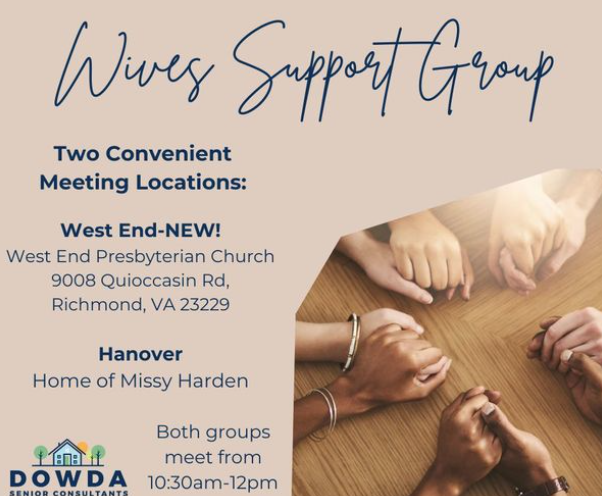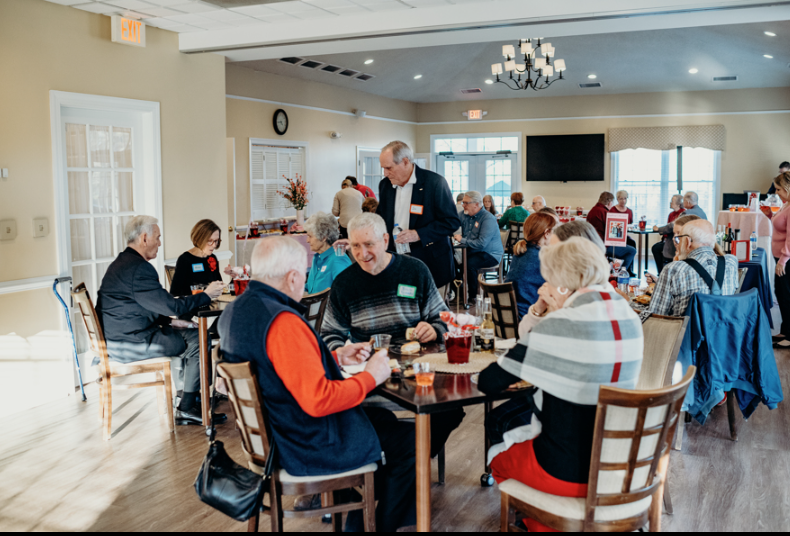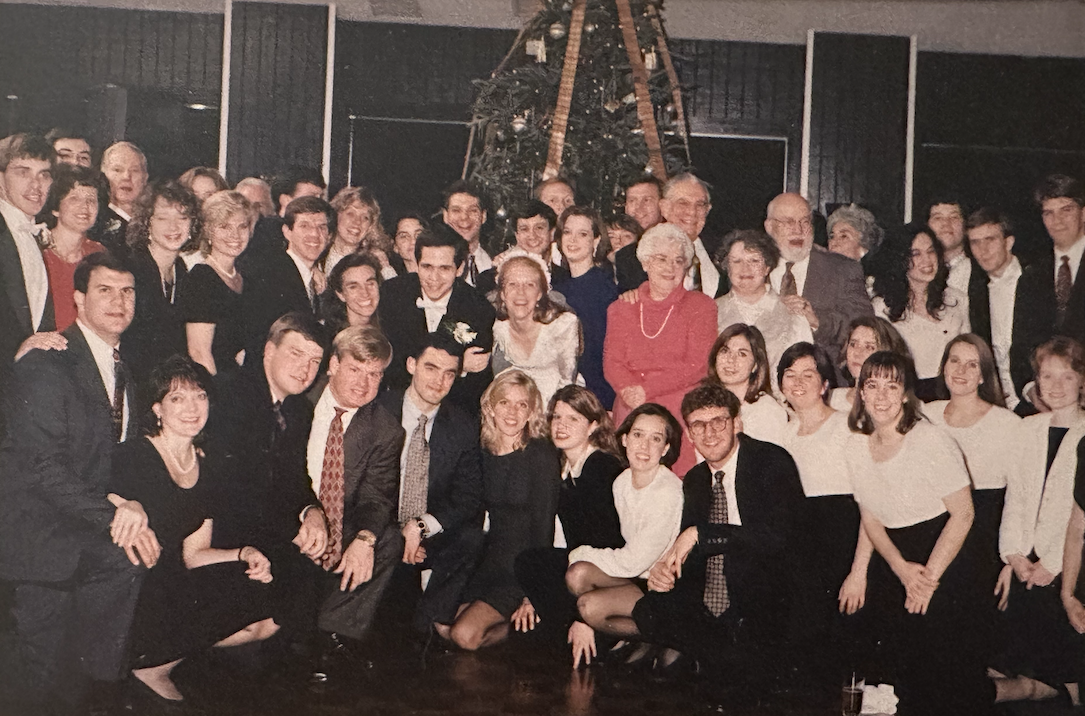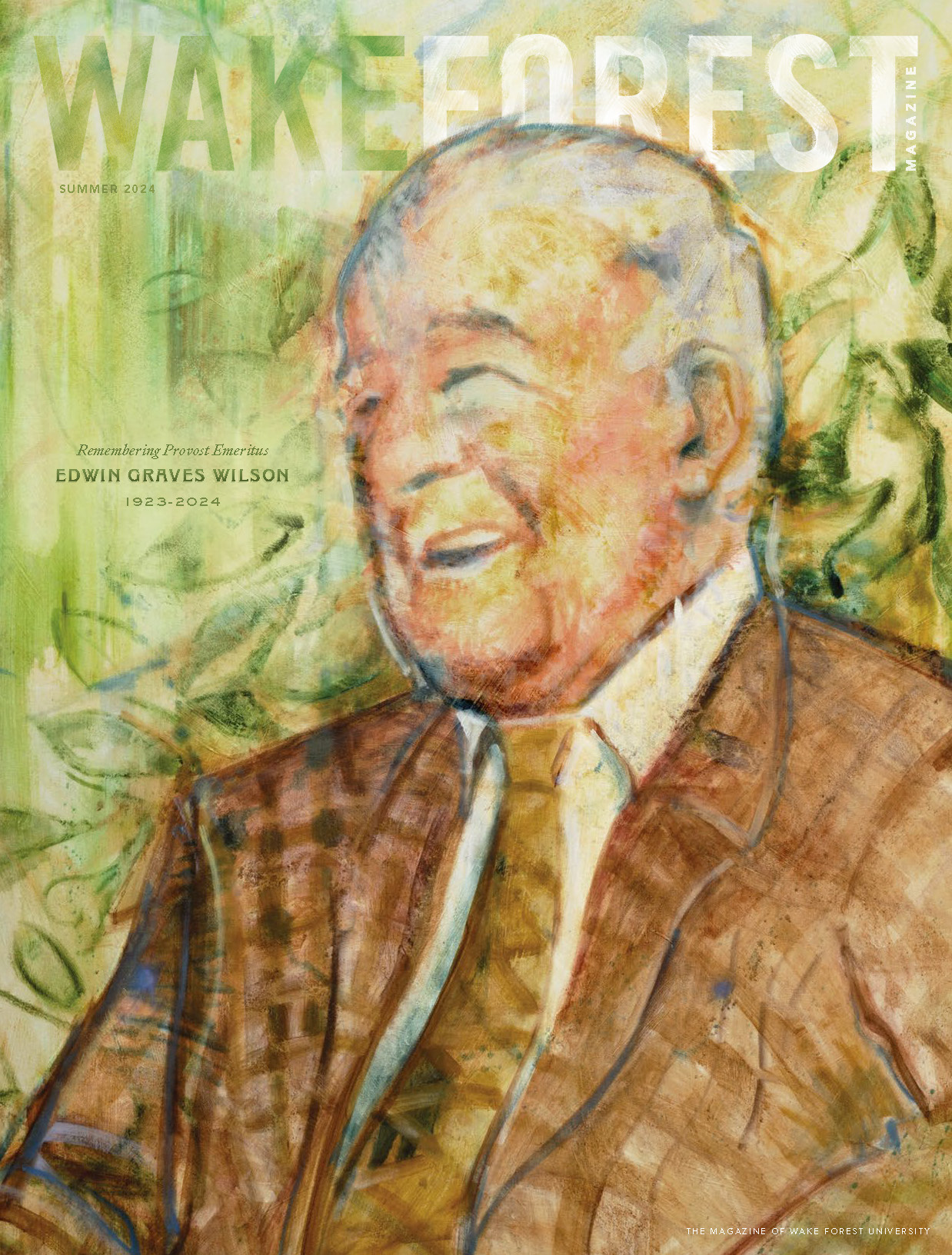Jen Wallace Dowda (’93) took a part-time job leading tours of assisted-living facilities with seniors and their families to save up for her children’s college costs. A decade later, making life better for the elderly throughout Richmond, Virginia, has become her full-time mission.
Dowda Senior Consultants, the firm Dowda started three years ago, provides comprehensive, ongoing support to older adults. She and her team of a dozen employees visit and support their clients whether they are at home or in a senior living community. They help line up the support clients need now and counsel families on what they might need down the road, along with providing dementia-care training.
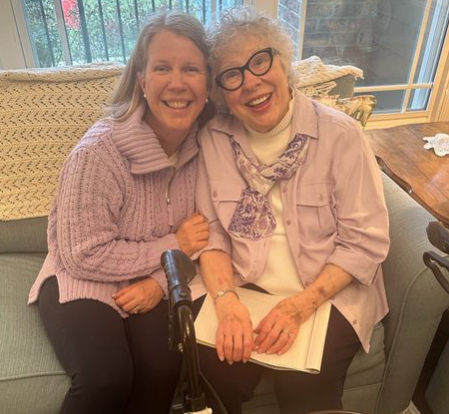
Jen Wallace Dowda (’93), left, visiting with a new client of her senior-care consultancy. Above, Dowda (second from left) with her expanding team. Photos courtesy of Dowda
Dowda and her team do it free of charge, funding their services for all clients through the referral fees that retirement communities pay the firm.
“What she’s doing is really interesting. It’s about learning families and building longer-term relationships,” says Kathryn Lawler, a national expert on aging services and CEO of Saint Joseph’s Health System/Mercy Care in Atlanta. “In a lot of ways, the system is in disarray. Navigating care is going to take on this profound level of importance, along with counseling families.”
For Wake Forest friends who have known Dowda through the years, her trajectory follows a natural progression. Dowda has always looked for ways to make connections, majoring in religion as an undergrad and delving into classes in many other subjects. Her major wound up serving her well when she became a pastor’s wife (she married Clint Dowda (’92)) and mother of four in Mechanicsville, Virginia, where she also started an after-school tennis program and has led programs for youth with special needs.
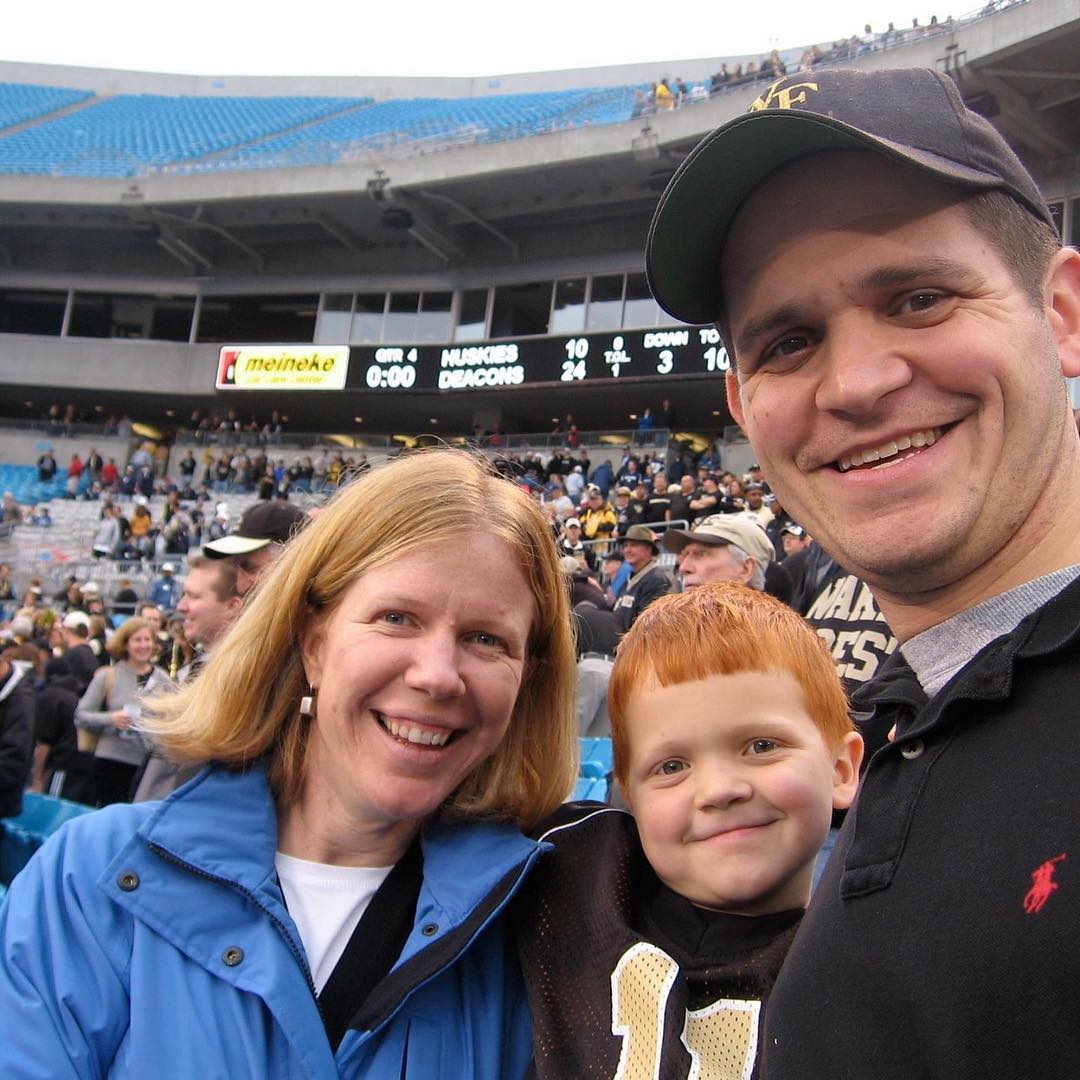
Jen and Clint Dowda (’92) with one of their four children, Harry, at a Wake Forest bowl game. Harry, now 23 years old, was named for his great-grandfather, who played football for Wake Forest before going pro.
Managing Editor Kelly Greene (’91) of Wake Forest Magazine caught up with Dowda recently to learn how she works with families and what she wants us all to know about aging in America — for ourselves and our loved ones. Excerpts have been condensed and edited for clarity and brevity.
Greene: You have been in the elder-care field for a decade. How did you get your start?
Dowda: We run a ministry for middle and high school kids with special needs that we started 18 years ago, and I was teaching tennis while my kids were growing up. My daughter’s junior year of high school I thought we needed to make more money to pay for college. Somebody in my church had a franchise that places people in assisted living. He hired me to (conduct) his tours.
I did that for six or seven years and increasingly realized that I desired to serve seniors in a more holistic fashion. So, we parted ways, and my goal was to keep teaching tennis, keep doing Capernaum (the Young Life group for teens with special needs) and have a few (elderly) clients that I would help with everything they need. I’ll visit them, and I’ll bring them cookies, and we’ll do all these things — help them move, help with whatever it is that they need, I thought. And so that was the original plan.
That isn’t what happened. Instead, it just kind of exploded super quickly. Thankfully, it worked out well. Even though the tennis business wasn’t huge, I had a dozen coaches and a couple thousand students over the years, so I know what it’s like to have some people to work for me.
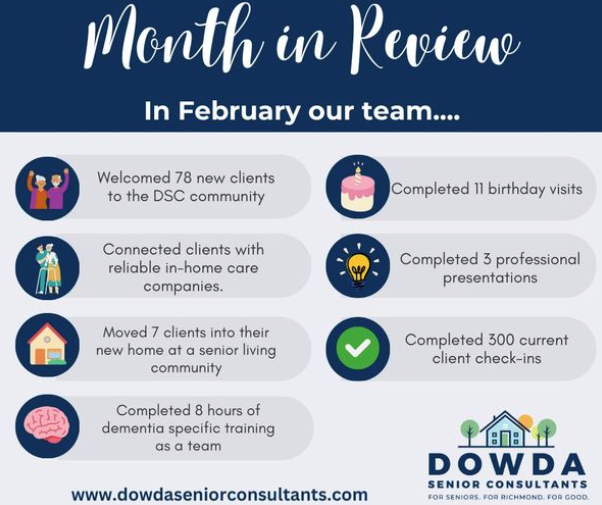
Dowda's firm is increasing its volume of clients and work every month, reflecting the need for help navigating elder care.
KG: Did your experience working with youth with intellectual and developmental disabilities help?
JD: I knew what it’s like to work with a vulnerable population who has a lot of needs and to make sure that they’re seen as people who need to have purpose and joy. And their family who’s supporting them needs so much support and needs to know that somebody’s stepping into it with them instead of just saying, “You should go do blah, blah, blah.” We’re saying, “Let me come alongside of you. Hold your hand. We’re going to do this thing.”
Eighteen years ago, when we started Young Life Capernaum in Hanover County, there were very few fun things for these kids to do. Most of what they were doing was going to doctor’s appointments, therapy appointments, etc. I feel like in the senior space, it’s still just basically that we want to keep you safe and give you some medicine without acknowledging that you’re this amazing person who has lived this incredible life, and we need to continue to help you. But you’re facing a lot of scary things, and your family’s terrified. So, at the same time we need to be really serious about medical things, we also need to figure out what do you want? How can we respect your wishes?
That’s a hard thing because the family says this, and the kids say (that). I do a lot of counseling of folks together. We all get on a Zoom screen, and everybody kind of shares what they’re thinking and feeling. We’ve had probably 1,300 clients at this point, and everyone is completely different. So, you just kind of step into it, and you’re like, “OK, tell me what’s going on. What kind of resources can we bring? What can we do?”
There are some common themes, but every situation is very different. That’s why we have to keep adding people. Now I have three people who make up a care team who take seniors homemade cookies on their birthday, because it feels really important to me that every senior feels known and loved.
KG: Did you basically invent this business model?
JD: Honestly, I stumbled into it. There are a lot of franchises that help you find assisted living, but that’s the only piece of it they’re doing. We do that, too, but then we use the funds that we make from those moves to do everything else. It’s kind of like a self-funding nonprofit. We’re like a nonprofit because we’re trying to do all the things and help all the people.
We changed our tagline about six months ago to “For seniors. For Richmond. For good.” We have the ability to be able to say, “Hey, this person is doing an excellent job,” and we’re forming a network. We call it the cocoon of care. So, our clients don’t have to worry who’s going to do this or who’s going to do that. We’re going to take care of that.
KG: Your business has grown so fast. Have you thought about slowing down your expansion at all?
JD: I have been counseled by others to stop taking new clients and start a wait list when we get to the saturation point. The reality is that there’s no way I can do that. I’ll just have to keep finding (new employees) because most people are in crisis. They get told all the time that they can’t see a doctor for months. They’re hearing that they have to wait everywhere. At least when they come talk to us, we can say, “Yes, we will talk with you right now.” That feels incredibly important to me — I want them to hear “yes,” and not “no.”
KG: Tell us about the “date nights” you host for couples living with dementia, including a Valentine’s Day event?
JD: Oh, my goodness, it was magical. We had 14 couples dancing. We had a fully catered dinner, and we had each of (the couples) go around and share something about how they met or their first date.
We have seen that when your loved one has dementia, you stop going out to dinner because you don’t know, he might reach over and grab something off somebody’s plate at the table next to you. So, we had all these couples who were lonely and couldn’t socialize. We thought, “Well, we’ll provide a space, and it’ll still be elegant and fancy, but if your husband grabs something off somebody else’s plate, nobody’s going to care.”
Anything we come across and think, “Oh, this is a need,” we meet it because we can. When it’s your own company, you get to choose what you do and how you do it.
KG: Were you close to any older people in your family growing up?
JD: Not really. All my grandparents had passed when I was still quite young or lived far away. I had never really had the joy of interacting very much with older adults until I started this job. It was like receiving a gift that I didn’t know existed.
I saw this need, … and this seems like a thing I could do. You get a dementia diagnosis, and they hand you an Alzheimer’s Association brochure and you’re on your way, or you’re at a hospital and your mom needs to go to rehab and they just hand you a list of 50 different places where to go, or you need to move your parents to a community, or you don’t know how to keep them home safely.
Everybody that you would ask advice from is representing something. … You can have case managers and social workers and doctors doing an excellent job of what they do, but they know what they know, and they are limited by time and space. They don’t have the ability to come to your house and sit down and listen to you for an hour.
KG: I noticed in your newsletter that your 77-year-old father-in-law lives with you?
JD: He lives in a separate house that’s connected to ours with a little room in between, and he’s independent. Living with him right next door, though, has caused me to think even more about what day-to-day life looks like for older adults, especially for those who have lost their spouses.
As adult children, we get overwhelmed by the desire to keep our parents safe, but we have to keep being reminded — safe for what? To go live somewhere that they don’t want to be?
Ask good questions like: “What are you concerned about? What are you worried about? What are you excited about?” . ... And then ask them, “How can I help you do that?”
KG: As a mother of four, what do you think is important for siblings to know about how to work together on care for their parents?
JD: Divide and conquer. Figure out, what are your gifts? What do you like to do? What are you good at? There are two incredibly generic stereotypes we find are often true: The daughters do the work, and the parents listen to the sons. It just is what it is. So, the son has to be the one who says, “Oh, I’m so excited, Mom and Dad, that we’re going to start having meals delivered for you.” And if somebody’s great with finances, have them help with budgeting.
Being honest with one another and realizing that it’s all really hard is important. So is being kind to each other and kind with yourself and flexible in the midst of it all. I do so much counseling with families. Everybody really is trying to do their best. Even in the midst of anger and yelling and being upset, it’s still because they care about each other, and they just don’t know what to do. Try to see the best intentions of your siblings, realizing you’re all trying to do the same thing, and you’re going to be doing it in different ways.
KG: What should people in their 40s, 50s and 60s be doing right now to feel like they can look forward to aging — to feel less anxious about it?
JD: It’s great when people see what their parents went through and buy long-term care insurance or move into a one-story house, but sometimes people don’t think as much about how they will be emotionally resilient in the face of a loss. I think what’s important is being willing to let things go and let other things take their place.
Instead of focusing on what you can’t do anymore, ask what the different things are that you can do now, and how you can embrace that. Maybe I used to be out running around all over the place, and now I can’t go anywhere. But now my granddaughter can come over and bake cookies with me because I’m here. What are the things that still (bring you) purpose and joy?
A lot of seniors are living at home and feel like, “I’m never going to move to a community.” And then for whatever reason they agree to it, and then they say, “This isn’t what I thought it would be like.”
Keeping an open mind to new things is so hard. So, start to foster the kinds of relationships where you have people who know you and you trust who will help you be open to trying new things.
KG: That’s great advice at any age. Thank you.

